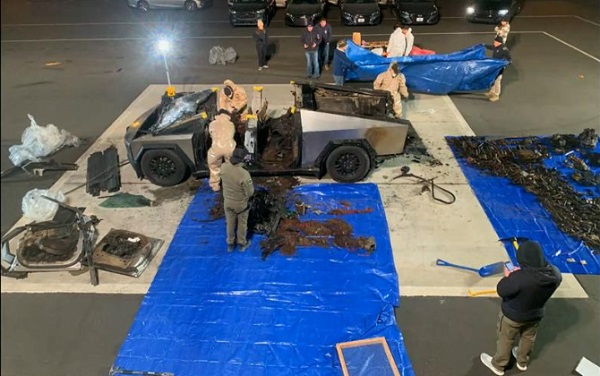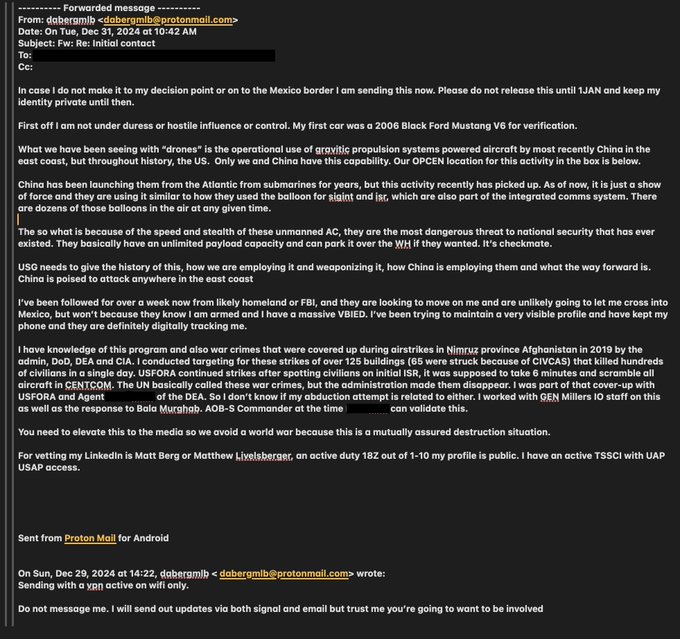espionage
Vegas Cybertruck bomber may be whistleblower

A guest Friday’s “The Shawn Ryan Show” podcast says Las Vegas Cybertruck bomber Matthew Livelsberger emailed him with an incredible claim.
Retired Army Intelligence Officer Sam Shoemate said Livelsberger claimed he was being followed by Homeland Security because they know he’s trying to reveal a high-level coverup of “advanced drone technology” launched by China.
Matt Livelsberger's Email
"I've been followed for over a week now from likely homeland or FBI, and they are looking to move on me and are unlikely going to let me cross into Mexico, but won't because they know I am armed and I have a massive VBIED. I've been trying to maintain a… pic.twitter.com/PQZt87G3Ox
— Shawn Ryan (@ShawnRyan762) January 3, 2025
During the podcast, The Shawn Ryan Show discovered they’d also received an email from Livelsberger. On the X platform, Ryan released the email as revealed by Shoemate.
The suspected Cybertruck bomber said he’s releasing this information to reveal the existence of “gravitic propulsion systems” which civilians have recently recognized as “drones” flying over the US east coast.
Livelsberger says only the US and China have this technology and China is demonstrating that they could use it. He calls these systems the “most dangerous threat to national security that has ever existed” and says “China is poised to attack anywhere in the east coast”.
The entire email reads:
“In case I do not make it to my decision point or on to the Mexico border I am sending this now. Please do not release this until 1JAN and keep my identity private until then.
“First off I am not under duress or hostile influence or control. My first car was a 2006 Black Ford Mustang V6 for verification.
“China has been launching them from the Atlantic from submarines for years, but this activity recently has picked up. As of now, it is just a show of force and they are using it similar to how they used the balloon for sigint and isr, which are also part of the integrated coms system. There are dozens of those balloons in the air at any given time.
“The so what is because of the speed and stealth of these unmanned AC, they are the most dangerous threat to national security that has ever existed. They basically have an unlimited payload capacity and can park it over the WH if they wanted. It’s checkmate.
“USG needs to give the history of this, how we are employing it and weaponizing it, how China is employing them and what the way forward is. China is poised to attack anywhere in the east coast.
“I’ve been followed for over a week now from likely homeland or FBI, and they are looking to move on me and are unlikely going to let me cross into Mexico, but won’t because they know I am armed and I have a massive VBIED. I’ve been trying to maintain a very visible profile and have kept my phone and they are definitely digitally tracking me.” (VBIED – vehicle-borne explosive device)
Livelsberger’s email concludes by alleging the coverup of “war crimes” in Afghanistan’s Nimruz Province that “killed hundreds of civilians in a single day.”
He begs the recipients of his email to verify his claims so the public receives this information without any influence from government agencies. “You need to elevate this to the media so we avoid a world war because this is a mutually assured destruction situation.”
In the Shawn Ryan podcast interview, Sam Shoemate suggested Livelsberger might actually still be alive.
Is Matt Livelsberger still alive?@samosaur pic.twitter.com/szoScNvEyN
— Shawn Ryan Show (@ShawnRyanShow) January 4, 2025
Considering all this potentially explosive information, podcaster Shawn Ryan said he’s “disappearing” for a while.
My family and I are disappearing for a few days. My account will be active but it will not be me behind the wheel. What we are about to release is mind boggling and will raise a lot of questions.
All media requests need to go to my producer @SRS_jeremy
— Shawn Ryan (@ShawnRyan762) January 3, 2025
The full interview, which as of Saturday afternoon has been viewed nearly 12 million times on X and nearly 4 million times on YouTube, can be seen here:
Business
Ottawa Is Still Dodging The China Interference Threat

From the Frontier Centre for Public Policy
By Lee Harding
Alarming claims out of P.E.I. point to deep foreign interference, and the federal government keeps stalling. Why?
Explosive new allegations of Chinese interference in Prince Edward Island show Canada’s institutions may already be compromised and Ottawa has been slow to respond.
The revelations came out in August in a book entitled “Canada Under Siege: How PEI Became a Forward Operating Base for the Chinese Communist Party.” It was co-authored by former national director of the RCMP’s proceeds of crime program Garry Clement, who conducted an investigation with CSIS intelligence officer Michel Juneau-Katsuya.
In a press conference in Ottawa on Oct. 8, Clement referred to millions of dollars in cash transactions, suspicious land transfers and a network of corporations that resembled organized crime structures. Taken together, these details point to a vulnerability in Canada’s immigration and financial systems that appears far deeper than most Canadians have been told.
P.E.I.’s Provincial Nominee Program allows provinces to recommend immigrants for permanent residence based on local economic needs. It seems the program was exploited by wealthy applicants linked to Beijing to gain permanent residence in exchange for investments that often never materialized. It was all part of “money laundering, corruption, and elite capture at the highest levels.”
Hundreds of thousands of dollars came in crisp hundred-dollar bills on given weekends, amounting to millions over time. A monastery called Blessed Wisdom had set up a network of “corporations, land transfers, land flips, and citizens being paid under the table, cash for residences and property,” as was often done by organized crime.
Clement even called the Chinese government “the largest transnational organized crime group in the history of the world.” If true, the allegation raises an obvious question: how much of this activity has gone unnoticed or unchallenged by Canadian authorities, and why?
Dean Baxendale, CEO of the China Democracy Fund and Optimum Publishing International, published the book after five years of investigations.
“We followed the money, we followed the networks, and we followed the silence,” Baxendale said. “What we found were clear signs of elite capture, failed oversight and infiltration of Canadian institutions and political parties at the municipal, provincial and federal levels by actors aligned with the Chinese Communist Party’s United Front Work Department, the Ministry of State Security. In some cases, political donations have come from members of organized crime groups in our country and have certainly influenced political decision making over the years.”
For readers unfamiliar with them, the United Front Work Department is a Chinese Communist Party organization responsible for influence operations abroad, while the Ministry of State Security is China’s main civilian intelligence agency. Their involvement underscores the gravity of the allegations.
It is a troubling picture. Perhaps the reason Canada seems less and less like a democracy is that it has been compromised by foreign actors. And that same compromise appears to be hindering concrete actions in response.
One example Baxendale highlighted involved a PEI hotel. “We explore how a PEI hotel housed over 500 Chinese nationals, all allegedly trying to reclaim their $25,000 residency deposits, but who used a single hotel as their home address. The owner was charged by the CBSA, only to have the trial shut down by the federal government itself,” he said. The case became a key test of whether Canadian authorities were willing to pursue foreign interference through the courts.
The press conference came 476 days after Bill C-70 was passed to address foreign interference. The bill included the creation of Canada’s first foreign agent registry. Former MP Kevin Vuong rightly asked why the registry had not been authorized by cabinet. The delay raises doubts about Ottawa’s willingness to confront the problem directly.
“Why? What’s the reason for the delay?” Vuong asked.
Macdonald-Laurier Institute foreign policy director Christopher Coates called the revelations “beyond concerning” and warned, “The failures to adequately address our national security challenges threaten Canada’s relations with allies, impacting economic security and national prosperity.”
Former solicitor general of Canada and Prince Edward Island MP Wayne Easter called for a national inquiry into Beijing’s interference operations.
“There’s only one real way to get to the bottom of what is happening, and that would be a federal public inquiry,” Easter said. “We need a federal public inquiry that can subpoena witnesses, can trace bank accounts, can bring in people internationally, to get to the bottom of this issue.”
Baxendale called for “transparency, national scrutiny, and most of all for Canadians to wake up to the subtle siege under way.” This includes implementing a foreign influence transparency commissioner and a federal registry of beneficial owners.
If corruption runs as deeply as alleged, who will have the political will to properly respond? It will take more whistleblowers, changes in government and an insistent public to bring accountability. Without sustained pressure, the system that allowed these failures may also prevent their correction.
Lee Harding is a research fellow for the Frontier Centre for Public Policy.
Artificial Intelligence
UK Police Pilot AI System to Track “Suspicious” Driver Journeys
AI-driven surveillance is shifting from spotting suspects to mapping ordinary life, turning everyday travel into a stream of behavioral data
|
|
-

 International2 days ago
International2 days ago“Captured and flown out”: Trump announces dramatic capture of Maduro
-

 International2 days ago
International2 days agoTrump Says U.S. Strike Captured Nicolás Maduro and Wife Cilia Flores; Bondi Says Couple Possessed Machine Guns
-

 Energy1 day ago
Energy1 day agoThe U.S. Just Removed a Dictator and Canada is Collateral Damage
-

 International1 day ago
International1 day agoUS Justice Department Accusing Maduro’s Inner Circle of a Narco-State Conspiracy
-

 Haultain Research1 day ago
Haultain Research1 day agoTrying to Defend Maduro’s Legitimacy
-

 Business2 days ago
Business2 days agoVacant Somali Daycares In Viral Videos Are Also Linked To $300 Million ‘Feeding Our Future’ Fraud
-

 Daily Caller24 hours ago
Daily Caller24 hours agoTrump Says US Going To Run Venezuela After Nabbing Maduro
-

 International1 day ago
International1 day agoU.S. Claims Western Hemispheric Domination, Denies Russia Security Interests On Its Own Border





